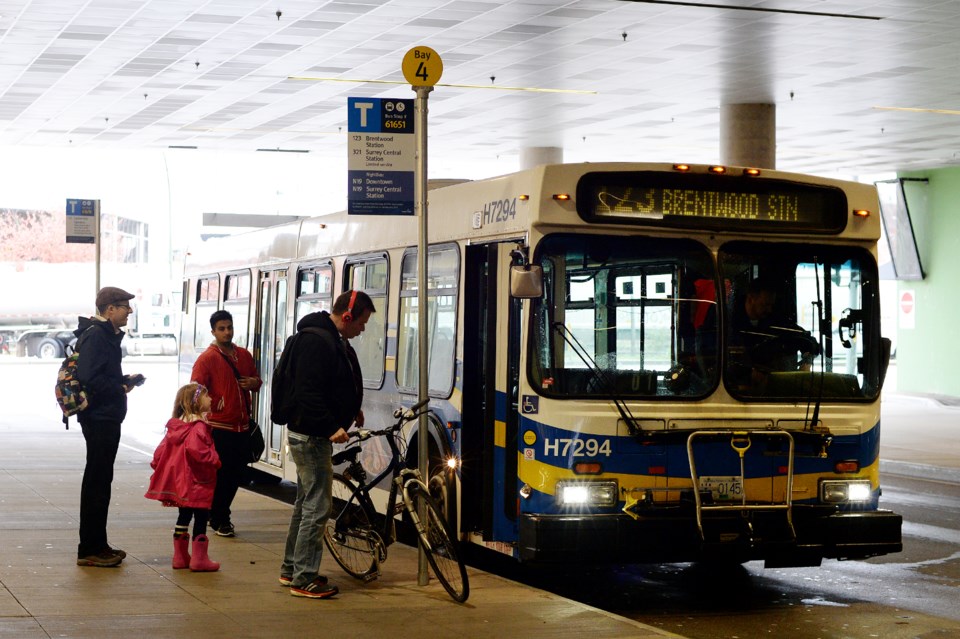The provincial government’s decision to fully fund a new Pattullo Bridge has helped push a $7-billion regional transit plan across the finish line.
The Mayors’ Council on Regional Transportation and the provincial government recently agreed on a plan to fund the regional share for Phase Two of the Mayors’ Council’s 10-Year vision. Phase 2 of the plan includes construction of Surrey-Newton-Guildford Light Rail, construction of Millennium line Broadway extension, upgrade of existing Expo and Millennium SkyTrain lines to expand capacity to meet and improve the customer experience, improvements to sidewalks, bikeways, multi-use pathways and roadways, and an eight per cent increase in bus service to address overcrowding, reduce wait times and bring bus services to communities with limited service.
While transit and transportation improvements have been a longstanding issue in the region, Mayor Jonathan Cote said funding has been a hurdle.
“I think this is a really big accomplishment,” he said. “Ultimately we are going to see some major investments like we have never seen in the Metro Vancouver region in public transit, and this is certainly going to help shape the region for the decades to come.”
Cote said every municipality in Metro Vancouver will benefit from the plan. He said New Westminster residents will see increased bus service and greater frequency and less overcrowding on SkyTrain because of the purchase of more SkyTrain cars.
“But I think the greatest benefit that someone in New Westminster will experience is they are now going to be able to access new parts of the region more efficiently and effectively with the investments of light rail south of the Fraser River and the Broadway subway line,” he said. “It’s important to recognize transit isn’t just about where you get on the station but it’s also where you can go.”
The provincial government has agreed to fund 40 per cent of the plan, while the federal government is willing to pay up to 40 per cent of the capital costs for major projects. The Mayors’ Council has proposed a number of initiatives to funds its portion of Phase 2:
* $1.6 billion in fare revenues expected from higher ridership resulting from service expansion in Phase 2, TransLink resources and efficiencies.
* A two per cent increase to all transit fares over two years beginning in 2020. This amounts to a five- to 15-cent increase to adult and concession transit fares and $1 to $3 increase to adult and concession monthly passes to pay for more bus improvements.
* 15-cents-per-hour increase for an average $5-per-hour parking. This is an increase from 21 to 24 per cent to the existing parking lot rate.
* $5.50 increase in property taxes per average household each year or about 46 cents a month, beginning in 2019.
* About $300 to $600 per unit increase to the development cost charge on new residential developments depending on the type of dwelling.
Cote said the region’s mayors “weren’t overly excited” about the increases proposed to fund the plan, but ultimately felt they were reasonable given they allow the plan to proceed.
“When it comes to the property taxes, I think it is important to recognize when we had the referendum, the local funding gap was $200 million that was trying to be raised. Through the additional partnerships with the provincial and federal government, that gap had been lowered down to $40 million a year. We are only looking at actually funding property taxes for $10 million of that,” he said. “It’s a pretty small figure compared to three years ago. … The difference between $200 million and $10 million is obviously quite significant and got us down to a modest level that I think everyone felt was reasonable and absolutely necessary to get the plan to finally be able to move forward.”
Cote said all the funding and tools are now in place to move forward with the investments and Metro Vancouver residents can anticipate that TransLink will start collecting funds from the various sources and implementing Phase 2 initiatives within one to two years.
Last month, the provincial government announced it was taking over funding and construction of the $1.4-billion Pattullo Bridge replacement project.
“It’s not a coincidence that the deal on transit came within weeks of the provincial government’s announcement on the Pattullo Bridge,” Cote said. “By taking the Pattullo Bridge off the Mayors’ Council and TransLink’s plate, that gave the region’s mayors the opportunity to finally sort out the transit plan. If that hadn’t had happened, I think we would still be in a stalemate in a difficult positon being able to move forward. I think that helped unlock the ability to get us past the finish line on this transit agreement.”



